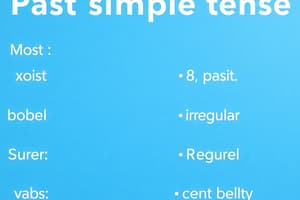Podcast
Questions and Answers
How is the past simple tense of regular verbs formed?
How is the past simple tense of regular verbs formed?
- By adding -ed to the base form (correct)
- By changing the original spelling
- By using a unique identifier per verb
- By modifying the vowel in the base form
Which sentence uses the correct structure for a negative past simple statement?
Which sentence uses the correct structure for a negative past simple statement?
- She not visited her grandmother.
- He did not play football. (correct)
- They did went to the park.
- I did not ate my dinner.
What is the past simple form of the verb 'go'?
What is the past simple form of the verb 'go'?
- going
- went (correct)
- goed
- gone
Which of the following sentences is correctly structured in the interrogative form of the past simple?
Which of the following sentences is correctly structured in the interrogative form of the past simple?
Which of the following is NOT an irregular verb?
Which of the following is NOT an irregular verb?
What is the correct past simple form of the verb 'see'?
What is the correct past simple form of the verb 'see'?
Flashcards are hidden until you start studying
Study Notes
Past Simple: Form and Structure
-
Definition: The past simple tense indicates that an action was completed in the past.
-
Form:
- Regular Verbs: Formed by adding -ed to the base form.
- Example: walk → walked, play → played
- Irregular Verbs: No fixed rule; each verb has a unique past form.
- Example: go → went, eat → ate
- Regular Verbs: Formed by adding -ed to the base form.
-
Structure:
- Affirmative Sentences:
- Subject + past form of the verb.
- Example: She visited her grandmother.
- Negative Sentences:
- Subject + did not + base form of the verb.
- Example: He did not (didn't) play football.
- Interrogative Sentences:
- Did + subject + base form of the verb?
- Example: Did they watch the movie?
- Affirmative Sentences:
Irregular Verbs
-
Overview: Irregular verbs do not follow the standard -ed ending in the past simple tense.
-
Common Irregular Verbs:
- be → was/were
- have → had
- do → did
- say → said
- go → went
- get → got
- know → knew
- take → took
- see → saw
- come → came
-
Usage Tips:
- Memorize commonly used irregular verbs, as they are frequently encountered in conversation and writing.
- Use flashcards or quizzes to reinforce memory of their past forms.
Past Simple: Form and Structure
- The past simple tense is used to express actions that were completed at a specific time in the past.
- Regular verbs form their past simple by adding -ed to the base form:
- Examples include: walk → walked, play → played.
- Irregular verbs do not follow a standard pattern and have unique past forms, requiring memorization:
- Examples include: go → went, eat → ate.
Structure of Sentences
- Affirmative Sentences: Structured as Subject + past form of the verb.
- Example: "She visited her grandmother."
- Negative Sentences: Formed with Subject + did not + base form of the verb.
- Example: "He did not play football."
- Interrogative Sentences: Inquire by using Did + subject + base form of the verb.
- Example: "Did they watch the movie?"
Irregular Verbs
- Irregular verbs are characterized by their unique past forms that bypass the -ed rule.
- Common examples of irregular verbs and their past forms include:
- be → was/were
- have → had
- do → did
- say → said
- go → went
- get → got
- know → knew
- take → took
- see → saw
- come → came
Usage Tips
- It's essential to memorize frequently used irregular verbs as they appear often in conversation and writing.
- Reinforcement techniques include using flashcards or quizzes to improve recall of irregular verb forms.
Studying That Suits You
Use AI to generate personalized quizzes and flashcards to suit your learning preferences.




